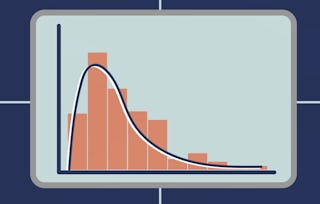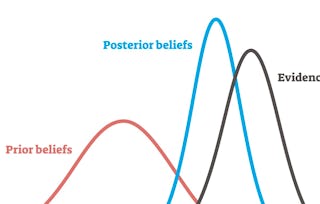A rigorous introduction to the theory of Bayesian Statistical Inference and Data Analysis, including prior and posterior distributions, Bayesian estimation and testing, Bayesian computation theories and methods, and implementation of Bayesian computation methods using popular statistical software.

Bayesian Computational Statistics

Bayesian Computational Statistics
This course is part of Advanced Statistical Techniques for Data Science Specialization

Instructor: Shahrzad (Sara) Jamshidi
Included with
Recommended experience
Skills you'll gain
- Statistical Modeling
- Sampling (Statistics)
- Model Evaluation
- Markov Model
- Statistical Inference
- Bayesian Statistics
- Data Analysis
- Probability
- Simulations
- Probability Distribution
- Statistical Analysis
- Regression Analysis
- R Programming
- Statistical Programming
- Logistic Regression
- Skills section collapsed. Showing 10 of 15 skills.
Details to know

Add to your LinkedIn profile
32 assignments
See how employees at top companies are mastering in-demand skills

Build your subject-matter expertise
- Learn new concepts from industry experts
- Gain a foundational understanding of a subject or tool
- Develop job-relevant skills with hands-on projects
- Earn a shareable career certificate

There are 9 modules in this course
Welcome to MATH 574 Bayesian Computational Statistics! This module covers the ideas of Bayesian inference. It focuses on a framework for Bayesian inference and discusses the general approach to computation.
What's included
11 videos5 readings4 assignments1 discussion prompt1 ungraded lab
This module equips students with a solid foundation in Bayesian inference for single parameter models, emphasizing both theoretical understanding and practical application.
What's included
17 videos4 readings4 assignments1 ungraded lab
This module provides an overview of Bayesian inference for multiparameter models, focusing on handling normal data, employing conjugate priors, and applying multivariate normal models to practical scenarios.
What's included
13 videos5 readings4 assignments3 ungraded labs
This module provides an understanding of large-sample inference and frequency properties in Bayesian analysis, focusing on normal approximations, large-sample theory, and the evaluation of Bayesian methods from a frequentist perspective.
What's included
14 videos4 readings4 assignments1 ungraded lab
This module provides an overview of hierarchical models within Bayesian inference, focusing on constructing priors, understanding exchangeability, performing analysis, and ensuring model validity and improvement.
What's included
9 videos4 readings4 assignments1 ungraded lab
This module provides a comprehensive understanding of Bayesian computation techniques, emphasizing numerical integration, simulation methods, and advanced Markov chain algorithms. Students will gain practical skills in implementing these methods and debugging computational issues.
What's included
12 videos4 readings4 assignments1 ungraded lab
This module consists of an overview of regression models in Bayesian inference, focusing on foundational principles, hierarchical linear models, and generalized linear models, with practical applications and advanced techniques.
What's included
19 videos4 readings4 assignments1 ungraded lab
This module covers advanced topics in Bayesian inference, focusing on the setup, interpretation, and application of mixture models, as well as addressing computational challenges and integrating mixture models with multivariate data analysis.
What's included
9 videos3 readings3 assignments1 ungraded lab
This module contains the summative course assessment that has been designed to evaluate your understanding of the course material and assess your ability to apply the knowledge you have acquired throughout the course.
What's included
1 assignment
Earn a career certificate
Add this credential to your LinkedIn profile, resume, or CV. Share it on social media and in your performance review.
Build toward a degree
This course is part of the following degree program(s) offered by Illinois Tech. If you are admitted and enroll, your completed coursework may count toward your degree learning and your progress can transfer with you.¹
Instructor

Offered by
Explore more from Probability and Statistics
 Status: Free Trial
Status: Free Trial Status: Free Trial
Status: Free TrialUniversity of California, Santa Cruz
 Status: Free Trial
Status: Free TrialUniversity of California, Santa Cruz
 Status: Free Trial
Status: Free TrialArizona State University
Why people choose Coursera for their career

Felipe M.

Jennifer J.

Larry W.

Chaitanya A.

Open new doors with Coursera Plus
Unlimited access to 10,000+ world-class courses, hands-on projects, and job-ready certificate programs - all included in your subscription
Advance your career with an online degree
Earn a degree from world-class universities - 100% online
Join over 3,400 global companies that choose Coursera for Business
Upskill your employees to excel in the digital economy
Frequently asked questions
To access the course materials, assignments and to earn a Certificate, you will need to purchase the Certificate experience when you enroll in a course. You can try a Free Trial instead, or apply for Financial Aid. The course may offer 'Full Course, No Certificate' instead. This option lets you see all course materials, submit required assessments, and get a final grade. This also means that you will not be able to purchase a Certificate experience.
When you enroll in the course, you get access to all of the courses in the Specialization, and you earn a certificate when you complete the work. Your electronic Certificate will be added to your Accomplishments page - from there, you can print your Certificate or add it to your LinkedIn profile.
Yes. In select learning programs, you can apply for financial aid or a scholarship if you can’t afford the enrollment fee. If fin aid or scholarship is available for your learning program selection, you’ll find a link to apply on the description page.
More questions
Financial aid available,

